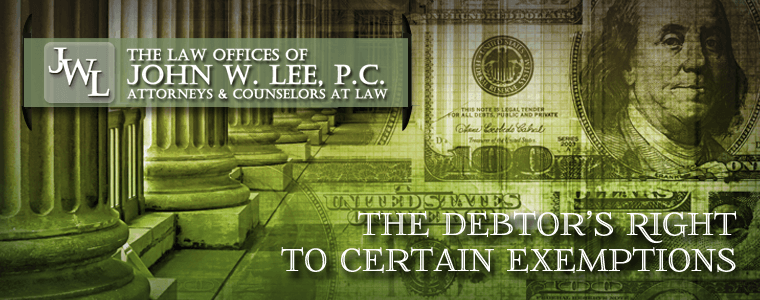U.S. Supreme Court Decision: Law v. Siegel, Chapter 7 Trustee
By John Lee
On March 4, 2014, the U.S. Supreme Court decided that a Bankruptcy Court could not surcharge a debtor’s properly-claimed exemption in property for the Chapter 7 Trustee’s administrative expenses; even if the debtor’s misconduct caused the trustee to incur the administrative expenses. The High Court pointed out that the Bankruptcy Court still had a number of powerful remedies to use against a dishonest debtor.
In this case, the debtor filed a Chapter 7 Bankruptcy listing the value of his real estate as $363,348.00. The debtor claimed his $75,000.00 homestead exemption and asserted that there were two other voluntary liens (mortgages) against the property. The liens, combined with the exemption exceeded the value of the property, thus making it not an asset the Trustee would want to administer and liquidate for the benefit of the creditors. The Chapter 7 Trustee determined that one of the liens was fraudulently placed against the property. It was suspected that the debtor fraudulently created the lien to make it appear that the property had no equity for the Trustee to liquidate. The Trustee filed an adversarial proceeding against to the debtor to show the lien was fraudulent so that he could administer the property.
The Chapter 7 Bankruptcy Trustee incurred over $500,000.00 in legal fees proving that the lien was fraudulent. The Bankruptcy Court allowed the Chapter 7 Trustee to surcharge the debtor’s homestead exemption for the administrative fees incurred by the Trustee. That means the Trustee kept the funds protected by the debtor’s homestead exemption to offset the legal fees expended in proving the debtor’s misconduct. The debtor appealed the decision to the Ninth Circuit Court of Appeals where they upheld the Bankruptcy Courts decision to surcharge the debtor’s exempted funds.
The U.S. Supreme Court reversed the Ninth Circuit and held that because the Trustee did not object in a timely fashion to the debtor’s claimed exemption, the Trustee could not offset the administrative expenses incurred proving the debtor’s misconduct in the case. The High Court ruled that the Bankruptcy Court’s equitable powers to hold a debtor in contempt for misconduct did not extend to striping the debtor of statutorily granted exemptions. The Court went on to say that the Court still had plenty of remedies against a dishonest debtor. The Bankruptcy Court could still deny the debtor his discharge or even prosecute him for bankruptcy crimes.
According to the findings of the Bankruptcy Court, the Trustee spent in excess of $500,000.00 in legal fees pursuing this debtor’s house. The debtor’s house was worth $363,348.00 total, minus two legitimate interests; (1) the debtor’s $75,000 exemption, and (2) a mortgage in favor of a legitimate bank in the amount of $147,156. That means there was only $141,192.00 in unprotected equity that the Trustee was entitled to access for the benefit of the creditors. This Trustee spent $500,000.00 chasing $147,156.00. I do not see where the High Court addressed this Trustee’s expenditure of funds, but I wonder if it played any part in the Court’s decision. To be fair, most likely the Trustee had no idea it would cost this much when he filed the adversarial proceeding. In this case, the Trustee most likely received the majority of the funds from the sale of the house in the form of administrative expenses, leaving almost nothing for the unsecured creditors he was representing.
Exemptions are laws that allow a debtor to keep certain property in a bankruptcy. The Trustee can take the debtors property if it is not exempt or fully encumbered by liens. The debtor has a duty to honestly disclose all of his assets and liabilities. Unlike California, Virginia does not have a $75,000.00 exemption for equity in real property. Virginia’s Homestead exemption only allows the debtor to keep $5,000.00 equity in real property. In some cases the debtor may be able keep up to $10,000.00 of the equity in their home.
In Virginia, the debtor is only allowed a once per lifetime $5,000.00 Homestead exemption. The Homestead exemption is not just for equity in the home, but also protects wages, tax refunds and life insurance cash values. That means if you used your exemption in a previous bankruptcy, you may not be eligible to use it again. In many cases the Trustee will seize the debtor’s tax refund, even if they have to wait until the next year to do it. Debtors that choose to file a bankruptcy without the benefit of a lawyer, often times using a non-attorney petition preparer, will save a couple of hundred bucks in filing the bankruptcy, but may loose their entire $5,000.00 tax refund the next year. Had the pro-se debtor spent a few extra dollars and hired a lawyer, they would have not lost their several thousand dollar tax refund.
Remember, Trustees are essentially paid on commission based on how much money that they can take from the debtor. In this case, the Chapter 7 Trustee spent over $500,000.00 in legal fees to seize a house that had less than $150,000.00 equity. Don’t try to save a buck by hiring a non-lawyer, petition preparer to assist you in bankruptcy or you could loose thousands of dollars when the Trustee seizes your bank account, cash, tax refund and life insurance. Don’t make the mistake of thinking you don’t have anything of value for a Trustee to take; in this case, the Trustee spent three times the value of the asset.
This may be considered advertising material.


